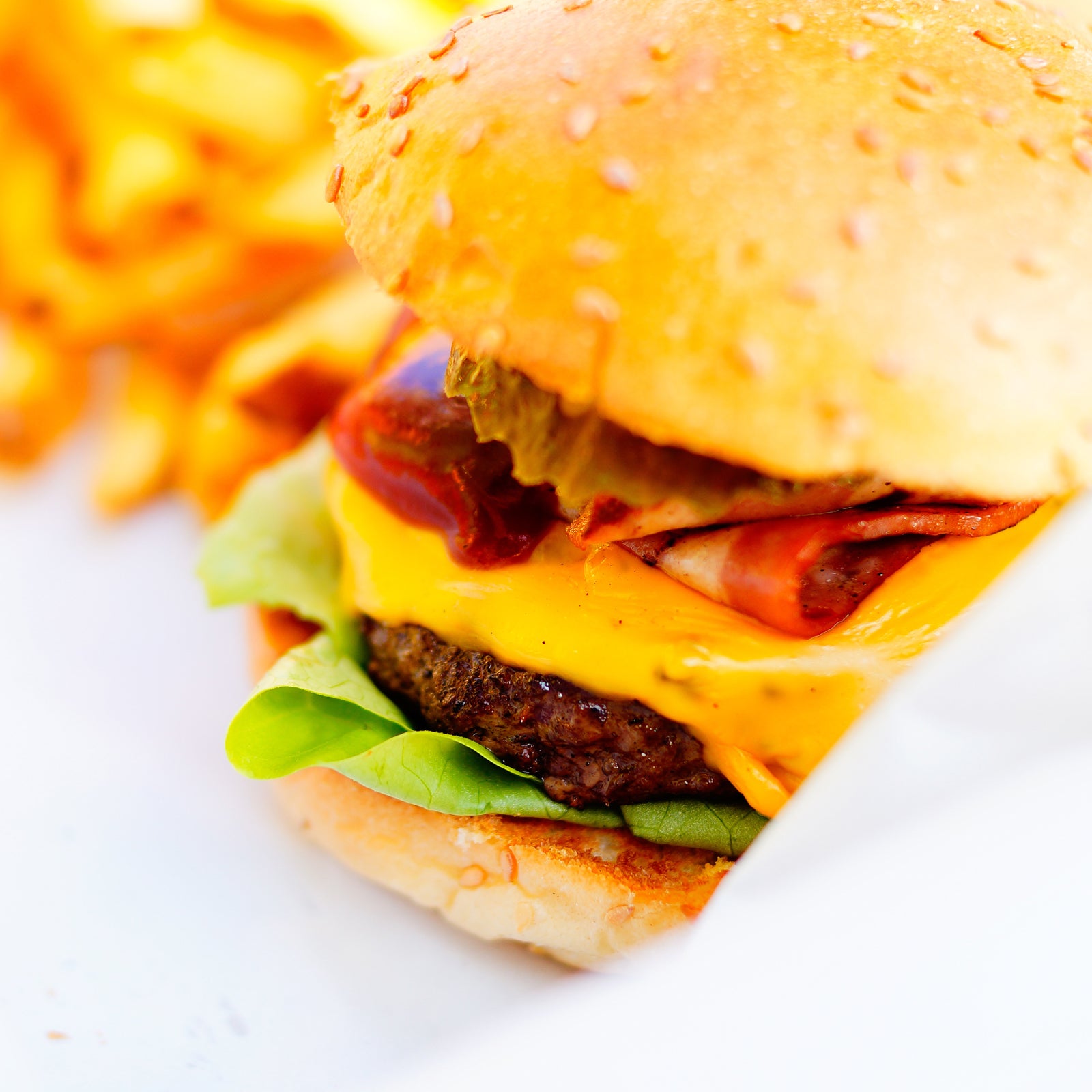IтАЩve been writing this Eat and Drink column for more than five years, and IтАЩve stated some pretty strange things during that time. But I never imagined myself saying this:
Thank you, McDonaldтАЩs, for being a leader in public health.
To be clear, while I have chowed down on McNuggets after a long training day, I rarely eat fast food. ThatтАЩs not likely to change, but I do suddenly find myself cheering on the most iconic chain of them all. In December, the company from 85 percent of its beef. (Medically important refers to drugs that are vital to treating infections in humans, too.) The promise builds on the companyтАЩs 2003 pledge to use antibiotics responsibly and its 2016 change to using antibiotic-free chicken.
McDonaldтАЩs isnтАЩt alone. Over the past few years, Chipotle, Panera, and Subway have all announced similar initiatives. PaneraтАЩs commitment to antibiotic-free poultry goes back to 2004. In 2015, Subway said it was phasing out antibiotics in its chicken, pork, and beef. Meanwhile, in December, Costco announced to limit antibiotics to therapeutic use in its beef by 2020. (McDonaldтАЩs and Costco declined to be interviewed for this story.)┬аStill, the McDonaldтАЩs announcement has the biggest potential to shift the market. The company is one of the largest single global buyers of beef, and its decisions have enormous influence on producers.
тАЬWhatтАЩs crazy is that we are looking to McDonaldтАЩs now for leadership on this issue,тАЭ says Lance B. Price, director of the Antibiotic Resistance Action Center at┬аGeorge Washington UniversityтАЩs Milken Institute School of Public Health. Price consulted with McDonaldтАЩs (pro bono) when it was setting up its new antibiotics policies. тАЬThis is democracy in action,тАЭ he says. тАЬThis is the voice of people who are educated on this issue┬аdemanding that someone lead. Our political leaders are not leading.тАЭ
So┬аwhy should you care? Because the habitual treatment of livestock with antibiotics can lead to the growth of antibiotic-resistant bacteria. These so-called superbugs kill approximately 23,000 Americans annually. (Price says thatтАЩs a conservative estimate.) , two of the most common foodborne bacteria, salmonella and campylobacter, lead to an estimated 410,000 antibiotic-resistant infections in the U.S. each year.
The habitual treatment of livestock with antibiotics can lead to the growth of antibiotic-resistant bacteria. These so-called superbugs kill approximately 23,000 Americans annually.
Many human factors contribute to superbug proliferation, including poor sanitation in hospitals and doctors overprescribing antibiotics to people. But agriculture is a significant culprit. When a farm doses animals in its herd with antibiotics, the animals can excrete some antibiotic-resistant bacteria┬аthrough their waste. (Humans do this, too, but in the U.S., human waste is treated, killing the bacteria in that process.) Because animal waste isnтАЩt always meticulously disposed of, superbugs can get carried off the farm by a dirty boot or a truck tire or dirty hands, then find their way into places they shouldnтАЩt be, like hospitals. The bacteria can also enter the food stream from contaminated water irrigating crops or from improperly handled meat. Serving undercooked meat or not washing cutting boards thoroughly after using them for raw meat can also spread bacteria, some of which may be superbugs.
Price says itтАЩs a constant struggle to get drug companies and agriculture regulators to push for stricter rules. тАЬI donтАЩt think the U.S. is the worst place in the world for drug use in animals, but it would be if we didnтАЩt constantly pressure them to prevent antibiotics from being overused in food-animal production,тАЭ he says.
The pressure seems to be working. тАЬIn the U.S., the domestic sales and distribution of medically important antimicrobials approved for use in food-producing animals has been in a steady decline since 2009,тАЭ says Tamika D. Sims, director of food technology communications for the International Food Information Council, a nonprofit research group. тАЬSpecifically, the sales decreased by 33 percent from 2016 through 2017,тАЭ she says, pointing to┬а.
When animal producers comply, progress is made. Price cites an example in 2005, when the U.S. banned the use of enrofloxacin, a drug that was given to prevent and treat infections in poultry. Enrofloxacin is an antibiotic related to ciprofloxacin, a medically important human antibiotic. Poultry producers used to put the drug in their chickensтАЩ drinking water. тАЬRelatively speaking, they used very little of it, but it led to a lot of resistance,тАЭ says Price. тАЬWe saw this resistance coming up very quickly. And as soon as they stopped using it, resistance levels flattened out.тАЭ
Jeffrey Sindelar, a meat specialist at the University of WisconsinтАЩs Meat Laboratory in Madison, cites another way these changes have been helpful. тАЬIt forced the poultry industry to think about alternative ways to maintain the health of their flocks,тАЭ he says, adding that producers have reduced the number of birds in each chicken shed and have had to keep facilities cleaner than ever before. тАЬFrom that angle, itтАЩs a healthy approach for the industry at large.тАЭ
Antibiotics are a crutch for bad animal husbandry. By getting rid of this crutch, producers have to create healthier, cleaner environments, where diseases are less likely to occur.
While fewer animals per foot and cleaner conditions are┬аwins, Sindelar worries itтАЩs not all happy pastures. If a cow that has never needed antibiotics sells for a higher price than one that has, will farmers think twice before treating their sick stock? тАЬThatтАЩs a true concern. Are there any situations where animals arenтАЩt being treated where they should be treated?тАЭ he asks.
Price understands this. His family owns a cattle ranch in Texas, and he thinks thereтАЩs a place for safe, well-regulated antibiotic use to treat sick animals. But he also feels that reducing antibiotic consumption is how we make our entire food supply more ethical. He has spoken to veterinarians for major food companies who say that antibiotics are a crutch for bad animal husbandry. By getting rid of this crutch, producers have to create healthier, cleaner environments, where diseases are less likely to occur.┬а
It will be interesting to see which┬аother major food companies follow McDonaldтАЩs lead. In the weeks after its announcement, ╠¤▓╣▓╘╗х announced enhancements to their beef-supply chains. But according to a Natural Resources Defense Council , neither initiative is as wide-reaching as McDonald's.┬а
Meanwhile, these programs take time. McDonaldтАЩs will spend┬а studying and measuring antibiotic use and setting targets for removing them from its supply channels. By 2020, the brand will begin reporting on its progress, but┬аas of now, there isnтАЩt a firm end date by┬аwhich the 85 percent goal will be achieved. The final timeline will be dependent on what the company finds in its study. On the poultry pledge, to stop selling chicken in the U.S. that had been treated with antibiotics important to human medicine in 2016, but it may take up to 2027 to fulfill that pledge in its restaurants worldwide.
тАЬI grew up with this mentality of тАШone bad day,тАЩтАЭ Price says, meaning that animals lived a good life on the ranch for months until slaughter day. тАЬBut when you look at how many animals are raised in the United States, every day is a bad day. When we do move back toward┬аthat one-bad-day model, what you see is antibiotic use goes down in the animals rapidly.тАЭ And that should lead to less resistance in antibioticsтАФand fewer sick days for humans.
ThatтАЩs our definition of a happier meal.


